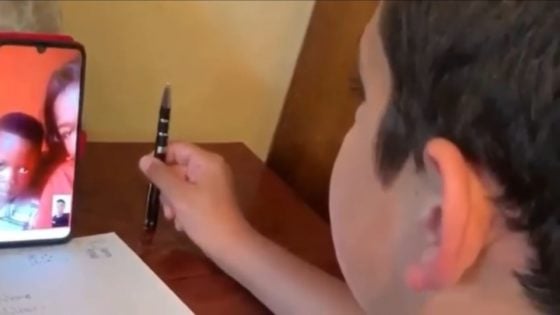Anyone can achieve the impossible, however, scientific research says that 92 per cent of people will not do so because of lack of self-esteem and direction.
The Young Dream Creators programme was designed on this hypothesis. The pioneer educational programme was created by Melbourne-based Global Opportunities Commercialisation to spark passion in children, bring them in contact with their peers across the world and give them the direction they need to complete a project they feel strongly about.
It all started a few months ago when Greek Australian CEO of GCO, Dr Chris Sotiropoulos, sat down with the company’s cofounders to discuss how they can inspire the younger generation and encourage them to aspire for a better world.
“What we found is that a lot of kids have a lot of ideas, but the school system does not allow these ideas to flourish as there are many strict processes in place,” Dr Sotiropoulos told Neos Kosmos.
“So we decided to create a programme that will identify the passion of the children, identify what areas they like and then develop it with an international focus”.
The programme, which is now offered as an extracurricular and school holiday activity in Australia, is also being developed in various new formats, so that it can be included in the curriculum, seeing how it has also attracted the attention of educational sectors abroad.
Since its launch Dr Sotiropoulos has been fascinated by the excitement, interest and the vision of the first young participants to embark on the Young Dream Creators journey.
READ MORE: International educational programmes for foreign students in Greek Universities

He described how two 11-year-old boys from a Melbourne school took on the challenge to develop a project they named ‘Communal Nations by kids’, that reached across eight countries from different continents.
“Like most boys, their passion was the internet and YouTube, but they also wanted to learn about other children of their age around the world, what their life is like, what their schools were like, their problems, and together to try and solve all these problems.
“With our contacts around the world, we arranged for them to meet kids of their age in eight countries, via WhatsApp, with all the parents involved,” Dr Sotiropoulos said. The children spoke with 30 children from Nigeria, India, America, England, Zimbabwe and Belgium.
“These kids were so excited to learn about Europe, Africa and the different issues they face […] They get a glimpse of what is happening with their peers across the world.”
They then went on to collate the data “and this is where the learning comes in, the academic side. They had to communicate it,” which they presented through a YouTube video.
Dr Sotiropoulos said he was astonished by the passion of another high school student, who, concerned about the environment, wanted to take the gas produced naturally from the compost, and put it back into the school for cooking and science experiments.
“So we spoke to our networks, to our engineers, and they introduced us to other friends, and all of a sudden, we developed a programme for this student and her friends, to find out what they need to do, to develop this piece of equipment,” he said.
“The girls are learning about science, measuring things, figuring out how things work, which means they are getting a lot of technical learning and at the same time they are doing something they really like. So that is the essence of what the programme is about.”
Through this programme “the core elements of education, comprising written, oral, mathematics, logical thinking and problem development may be learned effectively in a fun and collaborative environment whilst tackling issues important to youth. Also, any levels of anxiety are completely removed as they are empowered and respected by the program tutors,” Dr Sotiriopoulos said.
READ MORE: Greece can’t keep him: 8-year-old math whizz heads abroad to get education he needs

Navigating across various industry boards
“I like seeing people’s lives change through technology and innovation,” he responded when asked about his interesting and diverse academic background: a PhD in Molecular Microbiology, a Law Degree and Executive Training at Harvard Business School.
Being on many professional industry boards and charities, he has built a quality network across the world, and his knowledge of the global market has rendered him an expert in connecting people, and mentoring new startups across the globe, including Greece.
“Innovation is able to help change and improve the lives of all of us in society. Whether it is innovation in drugs, in teaching, in the environment. And everything I have done has been leading in that direction,” he said.
In addition to everything else he does, Dr Sotiropoulos is also authoring books on Ancient Greek Philosophy, as he believes that the basic principles of Αρετή (a moral virtue delivered through excellence) and Ευδαιμονία (to become the best you can be) are still very relevant today so we can understand the values of other cultures, respect them and work together effectively.
Dr Sotiropoulos, who is also on the board of the St Johns Greek Orthodox College, presented the Young Dream Creators Programme to an international audience at the 1st International Conference on Multidisciplinary Trends in Academic Research, organised by the Academic Development for Global leadership education Philippines.
Many commented on the innovative program which matches formal pedagogical models with students’ passion. Key organiser of the conference, was Greek instructor Rania Lampou who has been named ‘Best Teacher’ at the 2020 Global Teacher Awards, amongst other distinctions, but that is another story.

Schools interested in adopting and morphing the YDC program either within the curriculum or a stand alone School specific program, can have the programme created within a few weeks. Several formats of the YDC program will be released soon.
For more information visit the GOC Website: www.globalcommercialisation.com.









